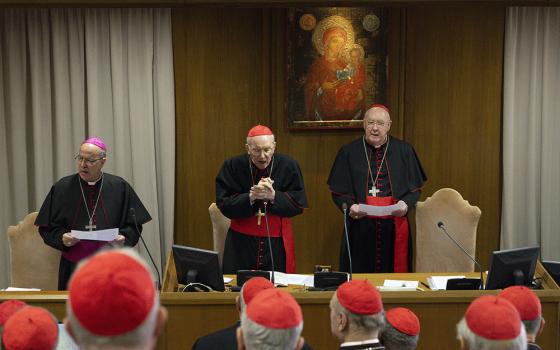
Sr. Jennibeth Sabay, a member of the Sisters of Our Lady of the Immaculate Conception of Castres, joins a video chat with her mother and grandmother. (Provided photo)

Sr. Jennibeth Sabay, a member of the Sisters of Our Lady of the Immaculate Conception of Castres, joins a video chat with her mother and grandmother. (Provided photo)
I had a brief chat with my grandmother via video call recently. She is turning 90 years old in September. Her sweet smile greeted me. She was happy to see us, her grandchildren, even through digital means.
According to health protocols, senior citizens (60 years old and above) in the Philippines are strictly prohibited from going out at this time of the pandemic. No wonder my grandmother complained to us that she has not been allowed to go out. She said, "We are like prisoners now with this pandemic. We cannot even go to attend Mass in the church."
She wakes up daily at 3 in the morning to pray and never missed a Sunday Mass before the coronavirus outbreak, despite her old age. She told me one time that she prays for each of her grandchildren every day. She is an inspiration to all of us.
Her example taught me the importance of a constant connection with God — not just at these trying times, but every day of our lives. It sustains and keeps us going on with life.
We are relational beings. Our relationships matter much for our survival and subsistence. Without them, we lose our meaning in life. It is important to cultivate daily our interrelationships with God, others and ourselves.
With this pandemic, we may face physical distancing and movement restrictions, but those will never hinder us from connecting and nurturing our relationships with God and fellow human beings.
Our relationship with God can be fostered in various ways through prayers, Scriptures, sacraments, silence, constant listening, and awareness of God's presence in our daily experiences and activities.
Recently, I was invited to share my lockdown experience — together with other religious presenters — in a Zoom episode of a Singles for Christ (a faith-based community) talk show program, on the topic "Where is God in this time of pandemic?" I realized that we have difficulty at times seeing God's presence in this challenging situation the world is facing today. But we believe by faith that God is always with us, never abandoning us. His love sustains us daily. God is in, with and among us, inviting us to be hopeful, courageous and loving in this challenging time.
I was reminded of a song that goes:
Our God is able
He is mighty
He is faithful
And he never sleeps
He never slumbers
He never tires of hearing our prayer
When we are weak
He becomes stronger
So rest in his love and cast all of your cares on him
Do you feel that the Lord has forgotten your need?
Just remember that God is always working in ways you cannot see.

Sr. Jennibeth Sabay (bottom row, center) participates in in a Zoom episode of a Singles for Christ talk show program. (Provided photo)
Furthermore, we can stay connected with others, despite distance and physical restrictions, keeping our relationships alive. Our simple gestures of reaching out to others, our thoughtful and caring ways, help much in giving hope and strength to others in times of crisis.
We are all in the same storm, experiencing the same health threat. However, we are not in the same boat. We are affected in different ways. That is why we need to be there for one another, keeping each other in our minds, hearts and prayers, and finding ways to communicate and listen to others.
Technology has been a helpful tool in keeping connected with others in this crisis. Despite constraints, it is still possible to be connected.
Also, we need to connect with ourselves and what is happening in us in this time of crisis — to take care of our well-being so we can keep going with hope, optimism and resilience. I remember a webinar I took online about finding meaning amid the crisis through positive psychology to enhance well-being.
Many emotions and feelings arise from this challenging situation we are facing: sadness, exhaustion, tiredness, worries, anger, anxiety and oversensitivity.
These are normal feelings, given this unprecedented situation. Most of the time when we are faced with challenges, we ask ourselves: What is the meaning of all this? And we ask: When will this end? Will everything be back to normal? What will happen if this crisis continues?
A speaker in the webinar quoted Joseph Campbell's words, "Life has no meaning. Each of us has meaning and we bring it to life. It is a waste to be asking the question when you are the answer." She mentioned ways to discover meaning in life, like creating a work, or accomplishing a task, experiencing something fully, or loving somebody.
Advertisement
Genuine positivity is also vital in keeping ourselves healthy. It is being grounded and aware that things are not going well — and doing something with it instead of feeling paralyzed; genuinely listening to ourselves and others' concerns; and recognizing, accepting and validating negative emotions in a nonjudgmental way. It also encourages help-seeking as needed when things are beyond our capacity.
I learned about the "positivity ratio" of at least 3:1 that helps you enter into an upward spiral of growth. To thrive, you need three positive emotions for every one negative emotion. For example, if we feel upset in the morning, we can actively seek at least three positive experiences in the day that make us feel good — like playing a sport, eating a favorite food, talking or greeting someone. Many activities can result in positive emotions.
Also, we can increase positive emotions, like an attitude of gratitude, optimism, humor and laughter, by taking care of our physical health — and most importantly our relationships.
Finally, at this time people need to be compassionate with themselves and others. We are in a challenging situation and we need genuine positivity to keep one another going. We can weather this storm with a positive mindset, by acknowledging the real situation we are facing and doing something that can uplift and encourage us to continue living.
We need one another's support, love and care — and we can start by being good to ourselves. Strengthening our relationships with others and ourselves, we can overcome this together. Above all, with faith and trust in God, we can go through all these storms in our life.
[Jennibeth Sabay is a junior sister of the Sisters of Our Lady of the Immaculate Conception of Castres. Before entering the novitiate in 2016, she was a public health nurse in Cebu Provincial Health office. Currently, she assists in a program called Pastoral Care for Children-Philippines. She also serves on a vocation team and at Emilie's Home, a program for women and children.]







